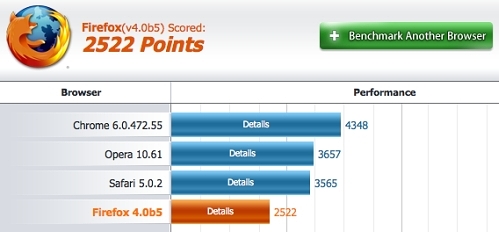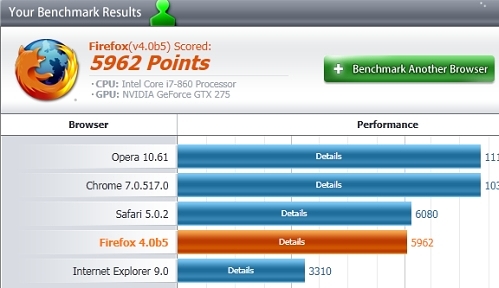Over the past few months, developers at Mozilla Corporation have engaged in the final stages of the software development cycle for the next major release of the organization's highly-acclaimed browser, Mozilla Firefox.
The company recently released Firefox 4.0 Beta 5, which includes a more streamlined interface (think Google Chrome), GPGPU acceleration toggle options, and a new Audio Data API that exposes raw audio data in the browser by making use of HTML5 standards. The latest beta release also includes the highly-anticipated Firefox Sync feature by default for synchronization of bookmarks, history, passwords and open tabs between multiple devices (including iPod, iPhone and iPad).

For Windows 7 users, Direct2D Hardware Acceleration is now enabled by default, whereas in Firefox 4.0 Beta 4 it had to be enabled through a command line switch. Mozilla has also been hard at work on a new feature introduced in Beta 5 known as the HSTS Security Protocol, which allows sites to insist that they only be loaded in the browser over SSL. This security mechanism increases the chance of a secure connection between client and server and ensures an extra protection safeguard for confidential information transactions.
Firefox 4.0 Beta 5 also addresses 637 new bugs since the previous release, all of which are listed on the Bug List webpage. Mozilla has publicly announced that a stable version of Firefox 4 should be ready for mass availability by November 2010. Until then, it is the responsibility of Mozilla's loyal user base to continue testing for stability issues, rendering anomalies and security holes, and to provide honest feedback in terms of the new UI layout, feature list and overall software package.
We were able to test Firefox 4.0 Beta 5 performance on a 13-inch Macbook running OS X 10.6.4 with an Intel Core 2 Duo 1.83GHz CPU and 2GB DDR2 667MHz memory. Unfortunately, the browser is doing worse than it has in previous benchmarks, and it still faces a tough uphill performance challenge in order to catch up to the likes of Google Chrome 6 Beta and Safari 5.0.2.

Futuremark Peacekeeper browser benchmark on a 13-inch MacBook
Update: We recently ran another Futuremark Peacekeeper browser benchmark comparison on a high-end PC running Windows 7 Ultimate x64 with an Intel Core i7 860 at 3.80GHz, an EVGA P55 SLI FTW motherboard and 4GB of DDR3 1600MHz CL7 memory. According to the results, which were tested twice for each browser, Opera 10.61 scores highest in the pack at the 11,100 point range, Google Chrome 7 Dev comes in second at the 10,300 point range, Safari 5.0.2 comes in third at 6,080 points, Firefox 4.0 Beta 5 comes in fourth at 5,962 points, and Internet Explorer 9.0 Preview indubitably comes in last at 3,310 points.

Futuremark Peacekeeper browser benchmark on an Intel P55-based Windows 7 PC
Firefox 4.0 Beta 5 is available in 39 languages and can be downloaded here.




